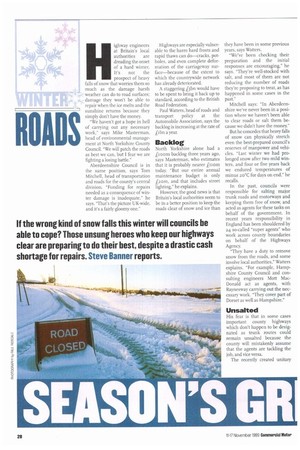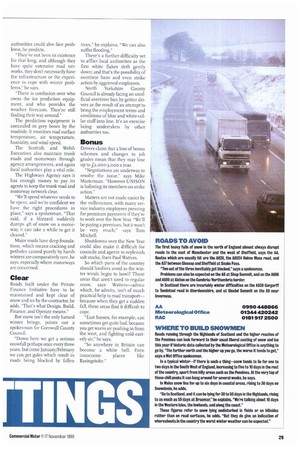OADg
Page 30

Page 31

If you've noticed an error in this article please click here to report it so we can fix it.
If the wrong kind of snow falls this winter will councils be able to cope? Those unsung heroes who keep our highways clear are preparing to do their best, despite a drastic cash shortage for repairs. Steve Banner reports.
ighway engineers at Britain's local authorities are dreading the onset of a hard winter.
It's not the prospect of heavy
falls of snow that worries them so much as the damage harsh weather can do to road surfaces: damage they won't be able to repair when the ice melts and the sunshine returns because they simply don't have the money.
"We haven't got a hope in hell of carrying out any necessary work," says Mike Masterman, head of environmental management at North Yorkshire County Council. "We will patch the roads as best we can, but I fear we are fighting a losing battle."
Aberdeenshire Council is in the same position, says Tom Mitchell, head of transportation and roads for the county's central division. "Funding for repairs needed as a consequence of winter damage is inadequate," he says. "That's the picture UK-wide, and it's a fairly gloomy one." Highways are especially vulnerable to the harm hard frosts and rapid thaws can do—cracks, potholes, and even complete deformation of the carriageway surface—because of the extent to which the countrywide network has already deteriorated.
A staggering L5bn would have to be spent to bring it back up to standard, according to the British Road Federation.
Paul Watters, head of roads and transport policy at the Automobile Association, says the baddog is increasing at the rate of Libn a year.
Backlog
North Yorkshire alone had a Doom backlog three years ago, says Masterman, who estimates that it is probably nearer Luom today. "But our entire annual maintenance budget is only L20111, and that includes street lighting," he explains.
However, the good news is that Britain's local authorities seem to be in a better position to keep the roads clear of snow and ice than
they have been in some previous years, says Watters.
"We've been checking their preparation and the initial responses are encouraging," he says. "They're well-stocked with salt, and most of them are not reducing the number of roads they're proposing to treat, as has happened in some cases in the past."
Mitchell says: "In Aberdeenshire we've never been in a position where we haven't been able to clear roads or salt them because we didn't have the money."
But he concedes that heavy falls of snow can physically stretch even the best-prepared council's reserves of manpower and vehicles. "Last winter we had prolonged snow after two mild winters, and four or five years back we endured temperatures of minus 2o*C for days on end," he recalls.
In the past, councils were responsible for salting major trunk roads and motorways and keeping them free of snow, and acted as agents for these tasks on behalf of the government. In recent years responsibility in England has been shouldered by 24 so-called "super agents" who work across county boundaries on behalf of the Highways Agency.
"They have a duty to remove snow from the roads, and some involve local authorities," Watters explains. "For example, Hampshire County Council and consulting engineers Mott MacDonald act as agents, with Raynesway carrying out the necessary work. "They cover part of Dorset as well as Hampshire."
Unsalted
His fear is that in some cases important county highways which don't happen to be designated as trunk routes could remain unsalted because the county will mistakenly assume that the agents are tackling the job, and vice versa.
The recently created unitary authorities could also face problems, he predicts.
"They've not been in existence for that long, and although they have quite extensive road networks, they don't necessarily have the infrastructure or the experience to cope with winter problems," he says.
"There is confusion over who owns the ice prediction equipment, and who provides the weather forecasts. They're still finding their way around."
The prediction equipment is concealed in grey boxes by the roadside. It monitors road surface temperature, air temperature, humidity, and wind speed.
The Scottish and Welsh Executives also maintain trunk roads and motorways through agency arrangements, and again local authorities play a vital role.
The Highways Agency says it has enough money to pay its agents to keep the trunk road and motorway network clear.
"We'll spend whatever needs to be spent, and we're confident we have the right procedures in place," says a spokesman. "That said, if a blizzard suddenly dumps 4ft of snow on a motorway, it can take a while to get it cleared."
Major roads have deep foundations, which means cracking and potholes caused purely by harsh winters are comparatively rare, he says, especially where motorways are concerned.
Clear
Roads built under the Private Finance Initiative have to be maintained and kept clear of snow and ice by the contractor, he adds. "That's what Design, Build, Finance, and Operate means."
But snow isn't the only hazard winter brings, points out a spokesman for Cornwall County Council.
"Down here we get a serious snowfall perhaps once every three years, but come January/February we can get gales which result in roads being blocked by fallen trees," he explains. "We can also suffer flooding."
There's a further difficulty set to afflict local authorities as the first white flakes drift gently down; and that's the possibility of overtime bans and even strike action by aggrieved employees.
North Yorkshire County Council is already facing an unofficial overtime ban by gritter drivers as the result of an attempt to bring the employment terms and conditions of blue and white-collar staff into line. It's an exercise being undertaken by other authorities too.
Bonus
Drivers claim that a loss of bonus schemes and changes to job grades mean that they may lose up to 12,000-3,000 a year.
"Negotiations are underway to resolve the issue," says Mike Masterman. "However UNISON is balloting its members on strike action."
Matters are not made easier by the millennium, with many service industry employees pressing for premium payments if they're to work over the New Year. "We'll be paying a premium, but it won't be very much," says Tom Mitchell.
Shutdowns over the New Year could also make it difficult for councils and agents to replenish salt stocks, fears Paul Watters.
So which parts of the country should hauliers avoid as the winter winds begin to howl? Those areas that aren't used to regular snow, says Watters—advice which, he admits, isn't of much practical help to road transport— because when they get a sudden fall, these areas find it difficult to cope.
"East Sussex, for example, can sometimes get quite bad, because you get warm air pushing in from the west, and fighting cold easterly air," he says.
"So anywhere in Britain can become a white hell. Even innocuous places like Basingstoke."
ROADS TO AVOID
The first heavy falls of snow in the north of England almost always disrupt roads to the east of Manchester and the west of Sheffield, says the AA. Routes which are usually hit are the 4628, the 46024 Holme Moss road, and the 457 between Glossop and Sheffield at Snake Pass.
"Two out of the three inevitably get blocked," says a spokesman.
Problems can also he expected on the 46 at Shap Summit. and on the 4686 and 4689 at Alston on the Cumbria/Northumbria border.
In Scotland there are invariably winter difficulties on the 4939 Corgarff to Tomintoul road in Aberdeenshire, and at Slochd Summit on the A9 near Inverness.
AA 0990 448866
Meteorological Office 01344 420242 RAC 0181 917 2500
WHERE TO BUILD SNOWMEN
Roads running through the Highlands of Scotland and the higher reaches of the Pennines can look forward to their usual liberal coating of snow and ice this year if historic data collected by the Meteorological Office is anything to go by. "The further north and the higher up you go, the worse it tends to get," says a Met Office spokesman.
In a typical winter—if there is such a thing—snow tends to lie for one to two days in the South West of England, increasing to five to 10 days in the rest of the country, apart from hilly areas such as the Pennines. At the very top of those chill peaks it can hang around for several weeks, he says.
In Wales snow lies for up to six days in coastal areas, rising to 30 days on Snowdonia, he adds.
"Go to Scotland, and it can be lying for 30 to 50 days in the Highlands, rising to as much as 59 days at Braemar," he explains. "We're talking about 10 days in the Western Isles, the lowlands, and along the coast."
Those figures refer to snow lying undisturbed in fields or on hillsides rather than on road surfaces, he adds. "But they do give an indication of whereabouts in the country the worst winter weather can be expected."












































































































